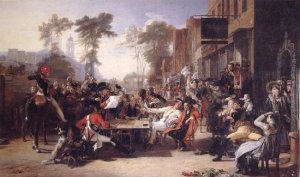Would you believe that all countries on earth will execute anyone within its borders who commits even the most trifling act of disobedience? You may think, “Surely, this is not the case. Very few countries submit to death any but the worse criminals.” Yes, this is certainly true; officially most Western countries have abandoned capital punishment. However, in practice, the State will kill—and without trial—any who push their dissenting positions hard enough. Take the following hypothetical trivial incident to its inevitable conclusion.
Suppose the city thinks it best to adorn your car with a wee bit of coloured paper, a mere four grams of thinly sliced, dyed cellulose pulp. And suppose the city then devises the sloth-brained notion that you now owe it a sum of money equal to a few hours of your labour. Well, you never asked for pretty cellulose pulp, and you reckon the price is too steep, anyway, if you had. So, being as sane as the next guy, you toss it aside and forget about the matter.
But, alas, the city persists in sending you yet more pulp, this time by mail and this time cellulose of a much less amusing nature: thicker, coarser, pure white except some threatening lettering. And, the city charges still more for this—added to the sum you already “owe” it. By now, you may be at the point of ignoring this nonsense out of pure principle. Do grown adults really send strangers unsigned slips of paper in the mail with demands of money for no discernible reason?
Remarkably, the city figures its authority derives from something called the State, from laws that you’ve never read and would never write, from the imaginations of people who have been long dead. And so, some other sliver of fibre arrives at your abode demanding your appearance in a courtroom. Well, you reckon, quite sensibly, that lawyer-types are the last people you’d like to spend an afternoon talking to, so you do not go. You are subsequently found in contempt of court. Or, maybe you decide differently. You do choose to attend (you need an excuse to duck the dentist anyway); whereupon, you inform the man sat in the tall chair that you’ve been very amused with the whole dance, thank you very much, and could we now knock it off? The consequences will be similar in either scenario.
A point will be reached where you come face-to-face with a police officer. Perhaps the judge orders him to restrain you right then and there. Maybe he comes menacingly round to your home. Or perhaps as you drive, he produces—like an adolescent who has just discovered fireworks—flashing lights and a hellish scream. Apparently something called a driver’s licence is revoked, even though it sits right there in your wallet. Well, now you are really up against it, for this is someone unreceptive to reasoned conversation. He means to physically disrupt you. You recoil; maybe you resist. He draws a gun. Quick, what do you have in your pockets to help you? Too late: you’re dead.
Can you now see that the most likely price for stubbornly refusing to pay a trifling parking ticket is your eventual extermination? Yes, it is true, you might get lucky and only be incapacitated by the officer, perhaps by a taser shot or a blow from a truncheon. But do you really want to rely on good fortune and an insufficiently cracked skull for your survival?
Taking this reasoning to its conclusion, can you imagine any scenario, whatsoever, where a regular individual without the power of money or a vast organization could violate any law, get identified for it, and still succeed in resisting the penalty (cash or jail time), that wouldn’t put him in eventual conflict with a cop? And are there any means to physically defeat the police force? Your expiration is the most likely outcome if you try hard enough. And remarkably, most people accept this as normal and correct.
Take the case of Robert Dziekanski killed by Canada’s national police force a few miles from where I now sit; killed for mildly resisting police attempts to detain him (he may have been armed against four cops with an office stapler); killed after causing some disturbance in an airport brought on by travel fatigue, lack of sleep, and frustrations with ten hours of airport bureaucracy. The consequences of this poor man’s death were public outrage, a coroner’s inquest, investigations, independent reviews, and various reports and recommendations.
The stream of events roughly followed a course that questioned whether the victim was much of a threat, whether the police were too forceful, or whether the taser is an appropriate weapon. The only question was whether the degree of police violence was appropriate to the circumstance—not whether representatives of the State should have been on location acting violently to begin with. In other words, had Dziekanski resisted the policemen’s advances more robustly, his death would have been palatable to society. The State is expected to kill. As Alexander Berkman wrote, “We are so steeped in the spirit of violence that we never stop to ask whether violence is right or wrong. We only ask if it is legal, whether the law permits it.”
It must be clear now that the State does not merely have a monopoly on violence, but it is inherently violent. We do not take our opposition to the State too far because we know it controls the police. We submit to the police because we know damned well what we are in for if we do not. Once you have defied the State, even to the smallest degree, you have set in motion an apparatus that cannot be reasoned with, one that will force your compliance on penalty of death.
At that frightening moment Dziekanski realized he would be shot, he exclaimed to those State officers, “Have you gone insane?” There is nothing sane about any of this.
Would you believe that all countries on earth have the death penalty and will execute anyone within its borders who commits even the most trifling act of disobedience? You may think, “Surely, this is not the case. Very few countries submit to death any but the worse criminals.” Yes, this is certainly true; officially most Western countries have abandoned penalty of death. However, in practice, the State will kill—and without trial—any who push their dissenting positions hard enough. Take the following trivial incident to its necessary conclusion.
Suppose the city thinks it best to adorn your car with a wee bit of coloured paper, a mere four grams of thinly sliced, dyed cellulose pulp. And suppose the city then devises the sloth-brained notion that you now owe it a sum of money equal to a few hours of your labour. Well, you never ask for pretty cellulose pulp, and you reckon the price is too steep, anyway, if you had. So, being as sane as the next guy, you toss it aside and forget about the matter.
But, alas, the city persists in sending you yet more pulp, this time by mail and this time cellulose of a much less amusing nature: thicker, coarser, pure white except some threatening lettering. And, the city charges still more for this—added to the sum you already “owe” it. By now, you may be at the point of ignoring all this nonsense out of pure principle. Do grown adults really send strangers unsigned slips of paper in the mail with demands of money for no discernable reason?
Remarkably, the city figures its authority derives from something called the State, from laws that you’ve never read and would never write, from the imaginations of people who have been long dead. And so, some other sliver of fiber arrives at your abode demanding your appearance in a courtroom. Well, you reckon, quite sensibly, that lawyer-types are the last people you’d like to spend an afternoon talking to, so you do not go. You are subsequently found in contempt of court. Or, maybe you decide differently. You do choose to attend (you need an excuse to duck the dentist anyway); whereupon, you inform the man sat in the tall chair that you’ve been very amused with the whole dance, thank you very much, and could we now knock it off? The consequences will be similar in either scenario.
A point will be reached where you come face-to-face with a police officer. Perhaps the court orders him to restrain you right then and there. Maybe he comes menacingly round to your home. Or perhaps as you drive, he produces—like an adolescent who has just discovered fireworks—flashing lights and an Almighty scream. Apparently something called a driver’s licence is revoked, even though it sits right there in your wallet. Well, now you are really up against it, for this is someone unreceptive to reasoned conversation. He means to physically disrupt you. You recoil; maybe you resist. He draws a weapon. Quick, what do you have in your pockets to help you? Too late: you’re dead.
Can you now see that the most likely price for stubbornly refusing to pay a trifling parking ticket is your imminent termination? Yes, it is true, you might get lucky and only be incapacitated by the officer, perhaps by a taser shot or a blow from a truncheon. But do you really want to rely on good fortune and an insufficiently cracked skull for your survival?
Taking this reasoning to its conclusion, can you imagine any scenario, whatsoever, where a regular individual without the power of money or a vast organization could violate any law, get identified for it, and still succeed in resisting the penalty (cash or jail time), that wouldn’t put him in eventual conflict with a cop? And are there any means to physically defeat the police force? Your expiration is the most likely outcome if you try. And most remarkably, most people accept this as normal and correct.
Take the case of Robert Dziekanski killed by Canada’s national police force a few miles from where I now sit, killed for mildly resisting police attempts to detain him (he may have been armed against four cops with an office stapler), killed after causing some disturbance in an airport brought on by his travel fatigue, his lack of sleep and his frustrations with ten hours of airport bureaucracy. The consequences of this poor man’s death were public outrage, a coroner’s inquest, investigations, independent reviews, and various reports and recommendations.
The stream of events roughly followed a course that questioned whether the victim was much of a threat, whether the police were too forceful, or whether the taser is an appropriate weapon. The only question was whether the police violence was appropriate to the circumstance—not whether representatives of the State should have been on location acting violently to begin with. In other words, had Dziekanski resisted the police’s advances more robustly, his death would have been palateable to society. The State is expected to kill.
It must be clear now that the State does not merely have a monopoly on violence, but it is inherently violent. We do not take our opposition to the State too far because we know it controls the police. We submit to the police because we know damned well what we are in for if we do not. Once you have defied the State, even to the smallest degree, you have set into motion an apparatus that cannot be reasoned with, one that will force your compliance on penalty of death.
At that frightening moment Dziekanski realized he would be shot, he exclaimed to those representatives of the State, “Have you gone insane?” There is nothing sane about any of this.








